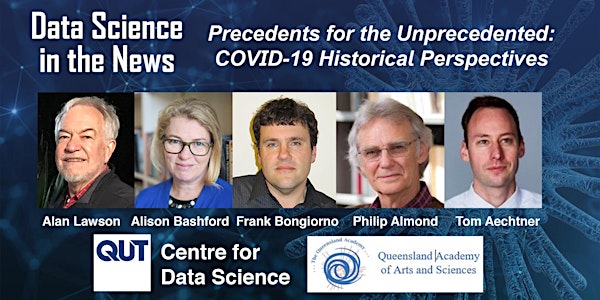
Data Science in the News #4: Historical Perspectives on COVID-19
Data Science in the News brings together a panel of expert researchers to share their insights into COVID-19 with a data science lens.
Date and time
Location
Online
About this event
Precedents for the Unprecedented: Historical Perspectives on COVID-19
This expert panel of researchers will share how data science can provide insights into COVID-19. This will be followed by a Q&A session.
This will be an online event only. Zoom link will be emailed to registrants on the day of the event
Moderator:
Emeritus Professor Alan Lawson - Secretary, Queensland Academy of Arts and Sciences.
Panellists:
Professor Alison Bashford, FBA, FAHA, FRHistS, FRSN - Professor of History and Director of the New Earth Histories Research Program, University of New South Wales.
Professor Frank Bongiorno AM, FRHistS, FASSA, FAHA – Head, School of History, Research School of Social Sciences, Australian National University
Emeritus Professor Philip Almond, FAHA – Institute for Advanced Studies in the Humanities, The University of Queensland
Dr Tom Aechtner - Senior Lecturer in Religion and Science, and Westpac Research Fellow, School of Historical and Philosophical Inquiry, The University of Queensland
More about the Panel Session Topics:
Professor Alison Bashford - Australia's borders and disease protection in the past
‘Unprecedented’ is a commonly used word in this coronavirus moment. But what is and isn’t different about this pandemic compared to others in Australia’s past? Medical historian, Professor Alison Bashford discusses responses to infectious diseases in Australian history. How has the continent fared in the past? What quarantine practices worked and what didn’t, on its various borders? How did Australians respond to government encouragement, and sometimes demand for isolation, at home or in coastal quarantine stations? Professor Bashford is especially interested in the maritime resonances between the current crisis and past epidemics. Stranded vessels, unable to dock, or turned into floating quarantine stations was a familiar phenomenon in the nineteenth century, but far less so in recent times.
Professor Frank Bongiorno - Pandemics, Australian History and COVID-19
The COVID-19 pandemic has seen an explosion of history talk: comparison with past plagues and pandemics, economic crises and depressions, major wars, and post-war reconstruction. History can offer insights into our circumstances. It can also mislead. Here, I’ll talk on these analogies in the context of Australian history in particular, suggesting that each needs to be treated with considerable caution in light of their radically different contexts. We are not witnessing a re-run of the Spanish Flu. We are not facing economic circumstances comparable with the crisis of the early 1930s. We are not at war. And while, on an optimistic reading, the other side of this pandemic may well provide opportunities for policy change, it would be unwise to underestimate the forces of resistance. Crises can generate rapid change, but they can also, as occurred in the 1950s, generate a powerful impulse to restore aspects of the status quo ante. History can illuminate these complexities. It can’t tell us what will happen next.
Emeritus Professor Philip Almond - Is God’s existence compatible with the Plague?
It’s not the end of the world. But with the Coronavirus running rampant, you could be forgiven for thinking so. The Four Horsemen of the Apocalypse symbolically portray the four events that will occur before the end of the world: plague, war, famine, and death. It is the first of these that is striking fear into hearts worldwide. But with the rhetoric of our being ‘at war’ with this disease, of ‘an invisible enemy, a high mortality rate, and increasing food shortages, all four horsemen appear to be riding out. How does God figure in all of this? Can any sense be made of the notion of divine providence – that all that happens in the universe is in accord with God’s plan – in the face of natural disasters? This talk looks at six different responses that have been given to these questions in the history of Western thought, including that of the agnostic and atheist.
Dr Tom Aechtner - Vaccine Uptake Challenges: Distrust, Danger, and Confidence
Australia maintains widespread support for immunisations, with most citizens reporting positive attitudes toward vaccines. Nevertheless, as in many other countries, a subset of the population expresses vaccine hesitancies, with apprehensions frequently linked to concerns about the safety and efficacy of vaccinations. Such hesitancies can pose challenges to keeping vaccine uptakes high, and they could also impact the receipt of a future COVID-19 vaccine. These fears can be stoked by small groups of vocal vaccine deniers who make antivaccine claims on the Internet, where many vaccine hesitant individuals go when seeking out immunisation facts. There are three overarching themes exhibited in such antivaccination media that tap into common vaccine hesitancies, which can be described as Distrust, Danger, and Confidence. This presentation briefly describes each of these central themes and relates how they may already be at play in the coronavirus pandemic.